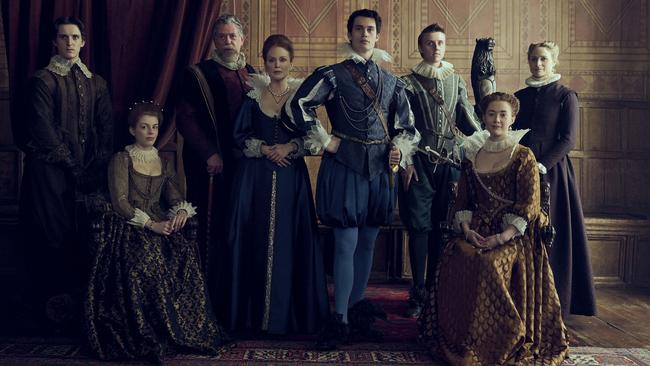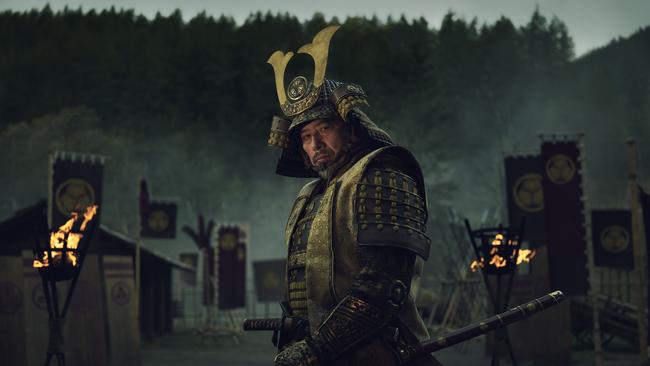Sex parties and f-bombs: period drama’s obsession with obscenity
Mary & George proves period dramas are hooked on swearing and orgies. Whether it’s Shogun’s fighting or Julianne Moore’s royal filth — obscenity is everywhere.

Have you noticed that people in period drama cannot stop saying the f-word? Or talking about orgasms, or marching, jadedly, through humping orgies, or screaming, as in Poor Things, “She grabbed my hairy business”? Watching two new shows this week – Mary & George and Shogun – both set almost at the same time in the early 1600s, I began to wonder, did all Jacobeans speak like Cardi B?
“If I were a man and I looked like you, I’d rule the f--king planet,” blasts Julianne Moore, as Mary Villiers, a madly ambitious sex mother, who in Mary & George (Binge) is preparing to launch her hot son, George, at the king. James I, son of Mary, Queen of Scots, liked men and had a number of “favourites”.

If George doesn’t go to France now to learn how to comport himself at orgies, he’ll live his life “smeared in the unwashable excrement of eternal shame”, she bellows. “Bon voyage.”
I must say, my lizard brain rather enjoys it – people screaming, frotting, cursing, behaving like animals/toddlers. It’s great in The Great. But I have no idea whether it’s good or bad, television-wise. It seems … a bit mannered? A bit lazy? Improbable? Or is it probable, now? No period drama seems complete without actors, dressed in incredible clothes, clopping through incredible, meticulously recreated worlds – Shogun will blow your mind – shouting: “Piss off!” It’s strange.
Villiers, by the way, is the perfect role for Moore – it’s a joy to watch her sex up to people. A provincial English noblewoman, she’s a poisonous Carole Middleton, desperate to get in with the king. Not, of course, by pushing her daughter his way – her other children are variously ugly or wet – but her gorgeous son.
Was whoring out male children to nobility normal? No one ever says. It’s true that Mary was a real person, and that with her help George became Duke of Buckingham. He was called “wife” by James, and shared his bed.
He was a dandy, a dancer, but also a highwire political negotiator – he is a character in Dumas. He would set up royal marriages, or entice painters like Rubens, who privately remarked on his “arrogance and caprice”. Nicholas Galitzine, who plays him, is none of these things: he’s a lumpen, pouting rugby player who just spends his time shimmying and throwing scarfs.
You’re probably better off bathing your eyes on the rest of the production: treacly, dark oak-panelled houses, misty forests, capes, capons, titfers for days. It’s as beautiful as a film but, as my boyfriend pointed out, aren’t most TV shows these days.

Tony Curran’s James I, by contrast, is unattractive: Billy Connolly in Jimmy Savile’s wig. He travels around with a huge pack of “Peacock Petes” – men with pearl earrings (and necklaces) who often line the roads, hoping to be noticed. Was he really this horrible, a predatory “dead-eyed horny-handed horror”? And were his boyfriends this odious, shallow and gross? I couldn’t watch the group sex scenes: too much cold, pasty arse. Why are we being made to hate them, though? I can’t remember a less friendly portrait of gay men.
Shogun (Disney+), meanwhile, is gripping: a sumptuous, startling, terrifically meaty rethink of the 1975 historical bestseller about John Blackthorne, the “pilot” of a ship owned by the Dutch. Wrecked off the coast of “the Japans”, he tells the locals he is a merchant, but really he’s a spy, trying to steal trade off the Portuguese.
I wasn’t going to review it: too remote, too boy’s own. But Cosmo Jarvis, as Blackthorne, is so boomingly mad in it, I kept watching. He sounds like five Richard Burtons. Not a single one of his early scenes doesn’t show him dribbling, crying, bellowing, getting pissed on, almost plunging to his death. Fighting a hairy Portuguese Catholic, he snarls: “Go back in your sty, dick up your arse.” I loved it.

As for the Japanese, what do they make of these disgusting, shouting, sick-covered foreigners? They offer them a wash. In boiling water.
On Netflix, there is The Gentlemen, a show by Guy Ritchie. You’ve possibly seen the puff about this: it’s set on – you’ve guessed it, a country estate, where – you’ve guessed it – everyone swaggers around in tweeds with shotguns. But here’s the twist, they’re all – you’ve guessed it – drug dealers! As for the rest of the plot – you’ve guessed it – they’re in trouble with other drug dealers. There’s a huge cannabis factory in one of the outhouses on the estate, and they’re in terrible trouble with the cocaine king of the north.

It is difficult to think of another director who’s evolved less than Ritchie. Honestly, how does he do it? He is a reverse Madonna. Does he actively reject interesting, diverse projects? Has he, for example, turned down a string of musicals, Shakespeare, Beckettian two-handers? Does he just think: no, I’ll keep on with the bare-knuckle fights and the tireless plugs for luxury goods? The Gentlemen isn’t even a remake of someone else’s film, but his own.
Theo James plays Duke Edward: he’s a quiet, Prince William type. If you were in any doubt how boring and noble he was, he’s literally a UN peacekeeper at the start of episode one. His father, disappointed with his brother, Freddy, gives him the estate and title when he dies, leaving Edward to sort out Freddy’s debts and the on-site “cheese” (weed) factory. Everything delivered in Ritchie’s wearing high camp.
What more is there to say about this by-numbers outing? James feels like a fifth or sixth choice for the role. He’s more at home playing sneering arseholes like the villain in The Inbetweeners, or, more recently, the lying tech millionaire in The White Lotus.
Kaya Scodelario, as his sidekick/love interest, also feels miscast: another sixth choice. She looks about 18, and too slight to carry off the big, brassy, sassy tart-with-a-heart role she’s been assigned in Susie Glass. Daniel Ings as Freddy, is, by contrast, the best thing in it. I’ve run out of space for The Rise and Fall of Boris Johnson, a thunderous documentary on Apple TV+. It has decent interviewees: Nigel Farage, Jeremy Corbyn and several mistresses. The stuff I’ve got through so far casts him, hilariously, as an actual serial killer, with menacing music, a grainy, dodgy 1970s background and people whispering that, as a child, he was “silent” and “deaf”.


To join the conversation, please log in. Don't have an account? Register
Join the conversation, you are commenting as Logout